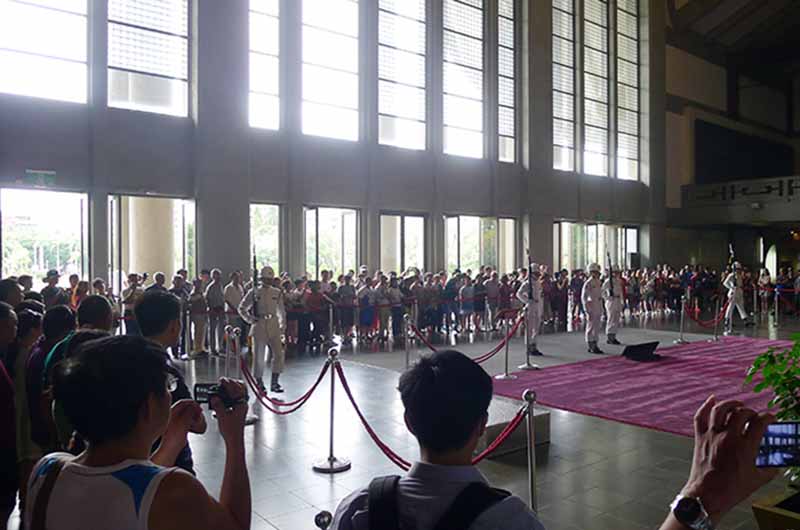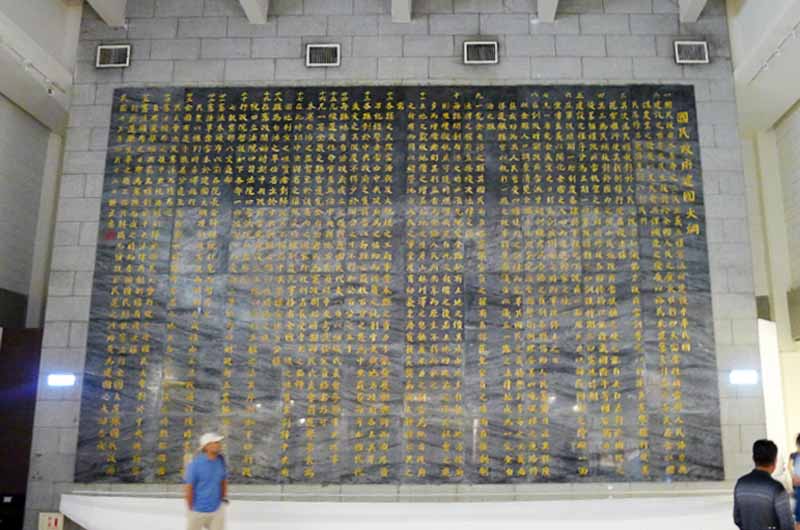Day two started with viewing the chic spaces of W Taipei in detail followed by a sumptuous lunch at the stylish YEN restaurant on the top floor of the hotel.
The view was fantastic. A few of the city attractions were conveniently situated in the Xinyi District neighborhood. I spotted where I was headed for the day.
First on the list was the National Sun Yat-sen Memorial Hall, a couple of blocks from the hotel.
 |
| The National Sun Yat-sen Memorial Hall at Xinyi District |
The name sounded familiar. Retracing my day one tour of the city, Sun was on the huge painting greeting visitors at the ground floor exhibit hall of the Chiang Kai-shek Memorial Hall. It was painting of Chiang and Sun on board the train from Guangzhou to Shaogun in preparation for the Northern Expedition.
 |
| A portrait & a selfie. A Chinese tourist having a moment with the National Father of China |
The Sun Yat-sen Memorial Hall is situated within Zhongshan Park (the most well-known and popular Chinese name for Dr. Sun is Sun Zhongshan). Gardens, decorative historical walls, and an exhibition and performance area surrounding Lake Cui, or Emerald Pond, make up the 28.4-acre park.
 |
| The rear entrance of attraction is the closest from the metro exit of the same name |
 |
| The property's site map |
 |
| Directions to the park attractions |
 |
| Statues of the founder of modern China are spread across the Zhongshan Park |
 | |
|
Across it, another Taipei attraction was rising- the Taipei Dome Complex. It’s something to look forward to check out on the next trip to the city.
The dome, a modern ovate edifice constructed in steel, provides a stark contrast to the 70’s building of the National Sun Yat-sen Memorial Hall, which highlights Chinese architectural details as instructed by President Chiang Kai-shek to architect Wang Ta-hung, whose design was selected among the other contest entries.
 |
| Designed by architect Wang Ta-hung, who won over other submitted contest entries. Chiang Kai-shek's funeral was held here in 1975 |
It was the Taiwan government that initiated the construction of the memorial in 1964 to pay tribute to the Republic of China’s National Father. The following year, President Chiang Kai-shek officiated the groundbreaking ceremony.
 |
| Old & new. The memorial hall & Taipie Dome are parts of the historical site |
In 1972, the 29,464 square-meter memorial building was completed with Sun Yat-sen’s statue dominating the entrance hall. It’s in this hall that the hourly formal changing of the guards transpires, another tourist attraction, and where Chiang’s funeral was held in 1975.
 |
| The statue of Republic of China’s National Father, Sun Yat-sen, dominating the main entrance of the hall |
 |
| The changing of the guards, an hourly tribute to a great man |
 |
| Packed with tourists |
Within the building are exhibit halls that display materials about Sun’s life and the Xinhai Revolution, a library, performance and lecture halls, a multimedia theatre and an audio-visual center.
 |
| A glimpse of Dr. Sun Yat-sen's past |
 |
| It prints the Fundamentals of National Reconstruction |
 |
| On the wall of "The Pioneer of Democratic Republic" |
 |
| Composite sculpture of the great man's monument are on put on display case of "Legacies of Dr. Sun Yat-sen" |
More than an educational center (the Memorial Hall became part of the Ministry of Education in 1986), it also opened its doors to social and cultural events like the annual Golden Horse Film Festival and Awards, Taiwan's highest movie award ceremony.
 |
| The West Dr. Sun Yat-sen's History Exhibition Room |
To get there: Nearest MRT station is the Sun Yat-sen Memorial Hall.
Email me at jinggoysalvador@yahoo.com. For more lifestyle & travel stories, visit ofapplesandlemons.com and jeepneyjinggoy.com
Also published in the SunStar Davao newspaper.















CONVERSATION